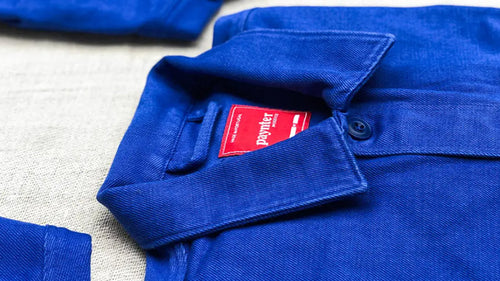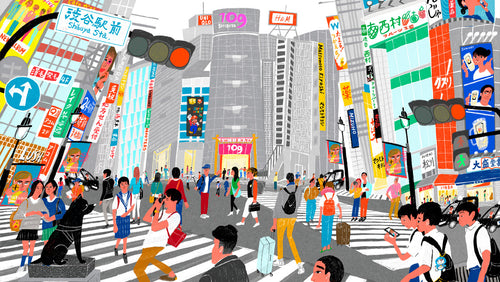
Chances are if you get really into any niche subject, you’ll likely end up going down a rabbit hole that leads to Japan. Love denim? Packaging? Kitchen tools? Pottery? Print? Menswear? Tech? Bathing? It’s hard to get geeky without finding yourself appreciating how the Japanese commit their lives to becoming world class as just one thing.
I first got obsessed with the country when I got into denim. I fell in love with how much they cared for something so simple. How they turned from being fans of vintage denim into the leaders of the future of quality denim. All because of an obsession with the blue cotton cloth. Ever since, I’ve been fascinated with the culture and craft of Japan and we’ve tried to distill their values, principles, and mindset into our own lives, business and style.

Of everything there is to appreciate, these are seven things we’ve learnt from the history and habits of a humble island nation:
A collection of learnings from Japanese designers, artisans, architects, businesses and chefs.
- 1 -
DETAIL OBSESSED
Last year, Champion, the heritage sportswear brand turned 100. Though it’s roots are in the USA, if you want the most authentic and highest quality Champion clothing, head to Japan. Champion Japan is run independently and has complete control over design and production of the Japanese line. The ‘small C’ hoodie that you buy there won’t be the same as the one you get in the US or the UK. Why? Japanese customers demand quality, so the attention to detail has to be next level.
Whilst most brands in the West are all fighting to be the next Nike or Warby Parker. Brands in Japan are fighting for quality. Every minor detail counts. They’re leaving us behind. They are drumming to a different beat. They have set their own standards. How something is made in Japan is just as important as what is made. This attention to detail has helped keep their crafts alive. Which in turn has meant they’re a nation rich in technical knowledge and know how. They really are detail obsessed.

- 2 -
THINK LONG TERM
There is no word for retiring in Japan. Apparently if you do leave work, you become a burden on society and are seen to have stopped following your passion. This is not because everyone is a workaholic, but because you may actually live longer if you keep working. Japan have the longest life expectancy in the world. They put it down to staying in work and keeping their minds and bodies busy. Everyone has a personal purpose. A reason to get out of bed in the morning. They are not thinking how they’ll spend 6-18 months at a job before moving onto the next one. This is not about overworking. Or burning out. Think long term. The job you’re about to take, the company you’re going to start, would you be happy doing this for the next 10-50 years? Are you ready to make it your life’s work? If so, go to work. Don’t retire.
- 3 -
STAY FOCUSED
Kongo Gumi, a Japanese construction company, is the oldest business in Japan. They’ve been around for over 1,400 years. They built Japan’s first Buddhist temple. And the temples they build are made without nails, only carefully crafted wooden joints. This kind of work can only done by highly skilled carpenters. If you work for Kongo Gumi, you will only do one part of the job. If you saw, then you will only saw. If you chisel, that’s your tool for life. They understand that you can’t be good at everything. You can’t be a master of many skills. You must focus on a single craft. Though it’s an extreme example, there’s a lot we can learn from it. Master a craft. Do what you love. And do it for a long time. It’s a humble life. There’s no hacking your way to becoming world class. It takes time and dedication. And they’ve only built temples for 1,400 years. That takes serious focus. No diversifying into hotels or houses. When you next need to build a temple, you know exactly who to call.
- 4 -
DON'T MAKE FOR THE MAINSTREAM
In Japan, print matters. Take menswear magazines for example. There are a million and more. Each one focusing on its own niche, age group and city. While Western magazines are trying to hold onto their dominance amid declining subscriptions, print in Japan is growing because of demand. Consumers as part of niche subcultures so making for the mainstream won’t work. So set yourself apart, don’t go after mass exposure. Engage with your community. Be part of a subculture. Find your tribe. And commit to them. Become a cornerstone to your community. Take your culture seriously. Then look after it and preserve it. If you want to be part of a disco loving motorcycle gang, there’s probably one you can join. If not, go set it up. Whatever you do, don’t aim for the mainstream.
- 5 -
THERE ARE MANY WAYS TO GROW
Too often the primary objective of a company is growth. In the West we’re obsessed with it. It’s what makes the headlines. It’s what all entrepreneurs aspire to. But in Japan they measure things a little differently. Growth is not as important. Maintaining presence takes precedence. Of course there are the capitalistic few for sure, but a lot of companies are comfortable in to their own lane and prefer to be outliers. Respect over revenue. They want to be known for doing great work. They want to be heavy hitters in quality, not quantity. This is a world view that we can totally get on aboard with. If you do great work, and earn the respect for it, revenue will follow.

- 6 -
NEVER STOP LEARNING
One of the many reasons that the Japanese often make Western clothing better than us is curiosity. Before making, Japanese brands do everything they can to learn about the origins of the garments, to be able to make the best possible pieces. They’ve taken vintage western clothes and obsessed over them. Inspecting every detail so they could learn how to make the best versions. But they didn’t stop there. They also learn about the cultures the clothes originated from, so they get to know much more than just the piece of clothing. They are product obsessed. And the products they make are heavily influenced by the history of the pieces. It’s as much about understanding the origins as it is enjoying their aesthetic. After all we can’t understand the future without understanding the past.
How much do you know about your clothes? Where did the style originate? What details were originally used before it became popular? Not only will you pick better pieces by asking more of your clothes, but you’ll have a much better connection to them too. Get geeky. Dig. Go down the rabbit hole.

- 7 -
CREATE YOUR OWN STYLE
We couldn’t write about Japan without talking about style. There, fashion is more important to the average man. And it’s not about a single style, it’s a mindset. What we love most is that’s it’s not all about the logos or relying on brands. It’s more about how you wear something and who’s made it. Style is personal. It’s an extension of interests and lifestyle. Pieces worn reflect a deeper knowledge for clothing. And vintage clothing plays a big part. Apparently, in Tokyo there are nearly as many vintage stores as there are high street clothing stores.
I feel there’s a huge sense of doing things your own way. Go down that rabbit hole, fed by your own curiosity. Understand the heritage and set your own standards for life, business and style. And don’t be greedy, there’s room for everyone. Find your tribe and serve them well.




